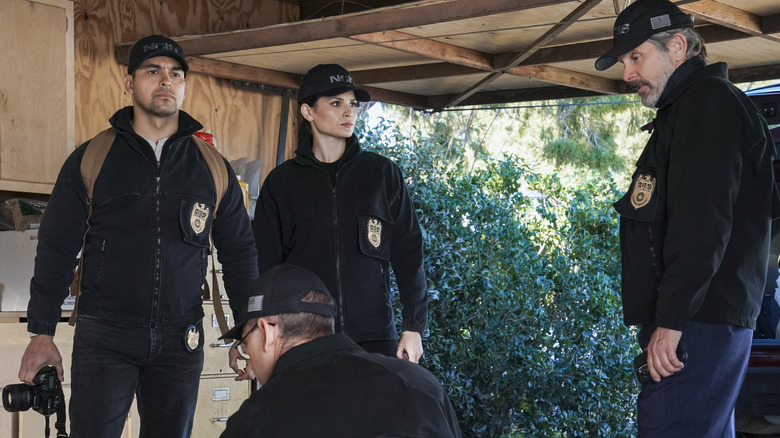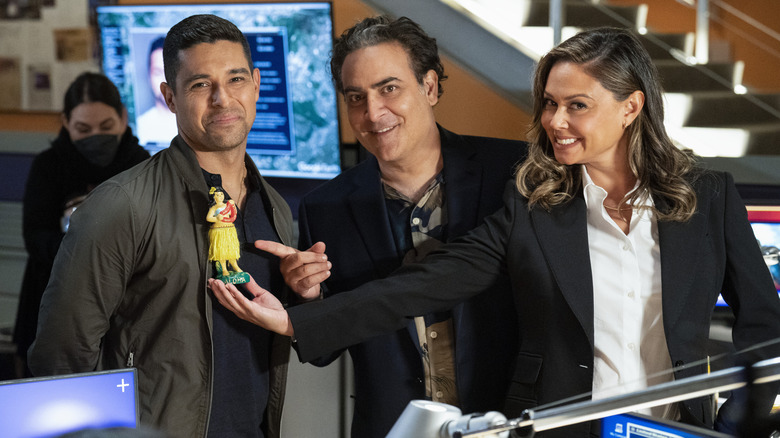NCIS, As We Know It, Needs To End
Every good show has to end sometime, and after a behemoth 21 seasons on the air — soon to be 22 seasons – it's about time for "NCIS" to finally come to a close. It's almost impossible to imagine the television landscape without the long-lived action-drama, but it's become equally impossible to manage, weathering many cast member changes through many eras. There are numerous ways to extend the life of a procedural, and "NCIS" has employed them all, much like its soon-to-be-deceased show-in-arms "Blue Bloods." But while shuffling characters and staying current with its subject matter may have given the drama a second life that's kept it on broadcast TV for years, it's hard to ignore the cracks in its foundation.
Whether it's the show's inability to contemporaneously address issues like AI or the fact that the characters that made the show what it is are long gone, it's hard to deny that today's "NCIS" is different from the show that first aired so many years ago. Here's why it ought to call it quits while fans still have fond memories of what made it a good time in the first place.
The show's formula is getting mighty tired
It's been two decades since "NCIS" first debuted on CBS. A lot of things have changed since then, but very little has transmogrified about the formula the show deploys week after week. A case will be presented to the team, usually connected to the Navy or some other branch of the military, which is fitting as they are Navy employees. The crime is usually brutal, bloody and enhanced with a fresh hook. Sometimes, the case involves someone that the team's intimately connected with. Other times, it reveals something about a chunk of their past.
It's the kind of formula that every procedural has done a version of since the genre was invented, but "NCIS" freshened things up — at least for a while. Lately, however, its age has been showing. Whenever "NCIS" tries to keep current with the technological times it produces an awkward note: its record on presenting plots related to AI — even using the tech to "resurrect" the dead — has already been noted as being weakly handled and behind the times.
It's not all bad news: sometimes the show's attempts at escaping its box — like the Western adventure we got during Season 21 — are downright admirable. But when it swings for the fences and misses, it's twice as obvious.
Losing Gibbs was one cast turnover too many
Any TV drama is bound to be subject to cast turnovers, especially if the show's a hit and has a long run behind it. "NCIS" is no exception to the rule, losing major members of the show's cast due to actor-dictated departures (Mark Harmon), backstage drama (Pauley Perrette, who left due to a conflict with Harmon), and death (David McCallum). Yet it's managed to soldier on through every loss, strategically hiring new actors and usually using them to their fullest.
Lately, however, it's hard to ignore the fact that there's something missing: Gibbs (Harmon). His gravitas, backstory, and relationship with the rest of the team drove the show for so long that it's hard to avoid noticing the big emotional gap in the series that exists without him. One could absolutely argue that Gary Cole's Alden Parker has injected new life and mystery into the drama, but "NCIS" just isn't the same without its fearless leader. It's a big signal that it would be wise to end the show now, before Parker leaves and also ends up ceding the main storyline to a new character.
Newer NCIS shows keep dying to keep the mothership alive
"NCIS" has existed for a long time, and its ratings continue to prove that it has earned its position on the Tiffany network's schedule. But with 21 seasons under its belt and CBS coping with a crowded schedule, it's starting to look like it's overstaying its welcome.
For example, "NCIS: Hawai'i" took the show's typical formula and gave it a new spin, focusing on people who aren't clones of Gibbs doing non-Gibbs-like things. When the drama was canceled, with CBS claiming it tried to save the series, fans understandably didn't buy it. Execs admitted it was partially due to the fact that the network has limited timeslots and that its streaming platform, Paramount+, is also stacked. The network keeps insisting that it wants to try new things and spruce up the schedule ... while greenlighting "NCIS" for Season 22 at the same time.
There's no reason why "NCIS: Hawai'i" should be canceled while its mothership program keeps chugging onward, slowly losing its crown as America's most popular drama. Keeping the old gray lady that is "NCIS" alive definitely has its benefits, but it shouldn't live to the detriment of other programs that could have runs that are just as long and fruitful.
It's better to go out on top
Then there's the ultimate lesson left behind by other popular series like "The Mary Tyler Moore Show," "M*A*S*H" and "Friends" — it's better to leave the airwaves at the top of the heap and have fans yearning for more than to watch them lose their interest as a result of too much creative shuffling. Lots of series have lasted for many seasons and ruined their healthy runs — and the memories of television fans — by staying too long and stretching their premises thin. One wants to be the guest who leaves the party early, instead of the one who overstays their welcome and becomes a nuisance.
If "NCIS" ends with Season 22, then it will have spent more time than most dramas get to entertain audiences worldwide. Sometimes, that's all a producer can ask of a long-running series. It's better to let the procedural go to the great rerun factory in the sky than watch it founder and die in real time.




